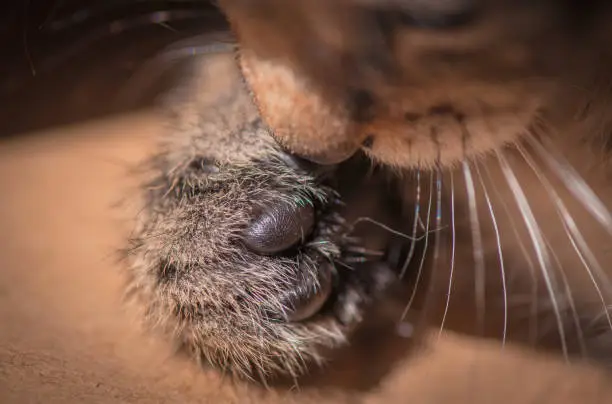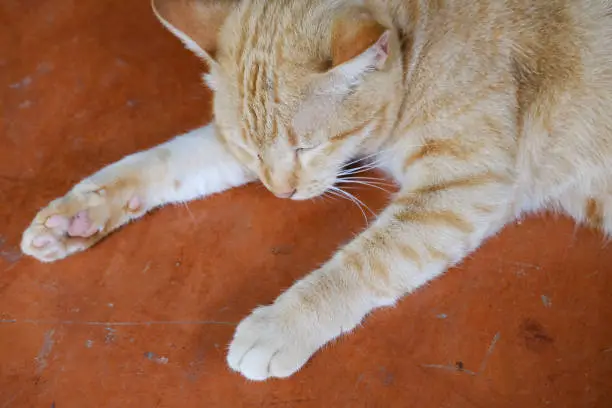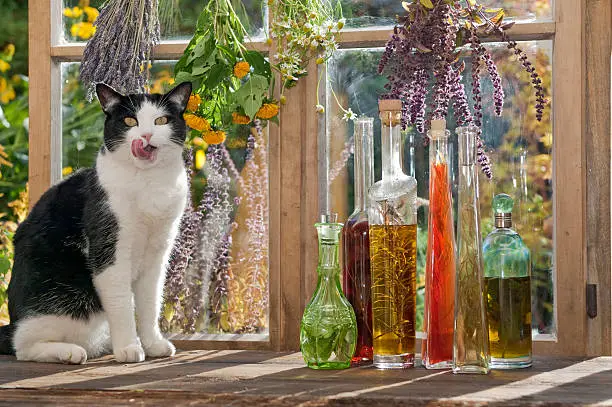Have you ever snuggled up to your purring cat only to notice the intriguing aroma of maple syrup wafting from their fur? Finding your feline friend smelling of pancake breakfasts or your favorite coffee sweetener may seem baffling. But several explanations would account for your cat smelling like maple syrup.
Why Does My Cat Smell Like Maple Syrup? From diabetes to kidney disease, we delve into the concerning causes of maple syrup smell in cats.
In many cases, enticing sugary scents clinging to kitty coats prove perfectly normal from maple-flavored foods or floral grooming shampoos. However, a persistent syrupy smell may sometimes indicate an underlying medical condition requiring veterinary attention.
Why Does My Cat Smell Like Maple Syrup?
Let’s unpack the possible reasons behind maple syrup smell in cats and when it warrants a trip to the vet.
Normal Causes of Temporary Sweet Smells
Before assuming the worst-case scenario, first consider harmless explanations for your cat’s saccharine stench:
Grooming Products and Perfumes
Shampoos, detangling sprays and even litter deodorizers frequently rely on sweet fruit extracts and maple fragrances – which transfer to fur during grooming. This article is key to understanding the facts about Why Does My Cat Smell Like Maple Syrup? Maple syrup smell in cats can be due to varying reasons.
Scent Marking From Feet
Special sweat glands between kitty paw pads secrete pheromones for territorial scent marks. These chemical cues often boast sweet, corn chip-like smells.

Maple-Flavored Food or Treats
It goes without saying that nibbling maple-cured bacon or maple-flavored cat treats can make your cat smell like a pancake house! As you can see, there are numerous perfectly normal reasons your feline friend may end up smelling sweet for spells – no cause for concern. It can be one reason for maple syrup smell in cats.
Concerning Causes of Persistent Sweet Smells
However, a pervasive syrupy smell that persists for weeks is not normal or healthy. Ongoing maple stenches suggest possible underlying illness.
Diabetes Causing Fruity Breath
Poorly regulated diabetes often makes cats’ mouths oddly smell sweet and fruity from high glucose levels – akin to acetone nail polish remover.
Kidney Disease Altering Litter Box Odors
Failing kidneys trigger a chemical change making urine smell sweetly pungent rather than its usual ammonia-like aroma.
Liver or Cancer Problems Affecting Body Scents
Dysfunctional livers or internal tumors disrupt hormone regulation and waste filtering, creating sickly-sweet skin or ear odors over time.
Notice the common thread? Chronic metabolic conditions cause the persistence of maple syrup smell. Unlike temporary scents, perpetual sticky-sweet smells warrant medical intervention.

Diagnosing and Addressing Maple Syrup Smell in Cats
What should you do when faced with an everlastingly sweet-smelling cat? Talk to your vet!
Here are the next steps:
Vet Checkups for Persistent Sweet Scent
Your vet will thoroughly examine your cat and ask pertinent questions to pinpoint causes of sweet smells. Be prepared to describe the odor’s nature, longevity, and accompanying symptoms.
Testing and Monitoring for Underlying Conditions
Based on suspicions, the vet may run bloodwork, urinalysis, radiographs, ultrasounds, or biopsies to diagnose diabetes, liver dysfunction, kidney issues, or cancer.
Treatment Plans To Resolve Health Issues
Once pinpointing any underlying illness, you and your vet will map out tailored treatment plans from dietary changes and oral medications to insulin injections – all targeting the root cause making your cat smell inexplicably like maple syrup smell.
While super sweet kitty scents may seem initially amusing, pets persistently reeking of pancake toppings need medical help determining the source. With attentive vet care and adherence to prescribed treatment plans, most cats return to their normal non-breakfast-themed smells and live happy lives. So make that vet appointment without delay if your four-legged friend strangely smells like an IHOP all the time – it’s in their best interest!

